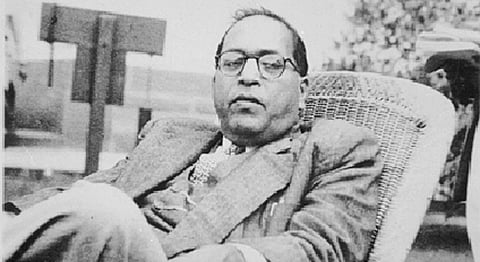
- HOMEGROWN WORLD
- #HGCREATORS
- #HGEXPLORE
- #HGVOICES
- #HGSHOP
- CAREERS
- ABOUT US
- CONTACT US

Today, April 14, marks the 125th birth anniversary of the architect behind India’s constitution and Dalit rights activist Dr. B R Ambedkar. On April 13, the United Nations observed Ambedkar Jayanti for the first time in history with a panel discussion.
The Permanent Mission of India to the U. N., in collaboration with the Foundation for Human Horizon commemorated the occasion with a panel discussion organised on ‘Combating inequalities for the achievement of Sustainable Development Goals (SDGs)‘.
In a circulated note, the Indian Mission stated that the ‘national icon’ Babasaheb remains an inspiration for millions of Indians and proponents of equality and social justice across the globe. It went on to say, “Fittingly, although it’s a matter of coincidence, one can see the trace of Babasaheb’s radiant vision in the Sustainable Development Goals adopted by the UN General Assembly to eliminate poverty, hunger and socio-economic inequality by 2030.”
As a Dalit rights activist advocating the abolition of social discrimination, Ambedkar’s fight for a separate electorate for lower castes (which was eventually opposed and reservation was implemented instead), labour rights, social equality and so forth make his contributions to the country one of the most relevant in the last century. The modern day Ambedkarite movement is significant in grass-root mobilisation and Dalit leadership in light of casteist atrocities across the country. In the span of the last one year, ‘Jai Bhim’ cries paired with pictures of Babasaheb have been invoked in the fight against atrocities such as Hyderabad University student Rohith Vemula’s suicide following social boycotting and institutional ostracisation, honour killings of Dalits who marry outside of their caste, the recent burning of a Dalit family in Haryana’s Faridabad district, sexual assault of Dalit women and several other incidents of caste atrocities.
Data released by the National Confederation of Dalit Organisations (NACDOR) from the National Crime Records Bureau (NCRB) showed a 245 percent rise in crimes against Dalits in a decade (from 2004-2013, as compared to 1994-2003). According to NCRB 2014 date, the chargesheeting rate in crimes committed against Dalits remains 92.3 percent, and the conviction rate a mere 28.8 percent.
PB Acharya, the Governor of Nagaland and Assam, noted that India should feel proud and happy of this UN honour, as it marks a recognition by the world of Ambedkar’s contributions. “He was the voice of the suppressed people of India,” he added.
Dr. B R Ambedkar was born on April 14, 1891, and died on December 6, 1956. Several writings he penned through his lifetime remain revered even today, such as ‘The Buddha’ and ‘His Dharma,’ ‘Annihilation of Caste,’ and ‘Who Where the Shudras?’ to name a few. He was posthumously conferred with the highest civilian award in India, the Bharat Ratna, in 1990.
